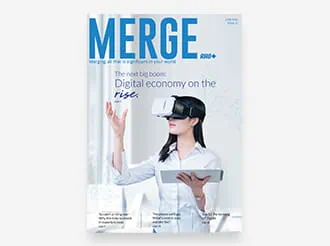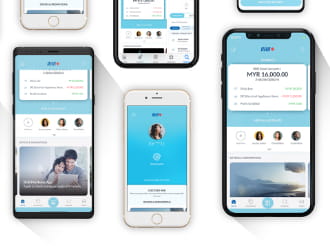New Year, New Finances: A Fresh Perspective on Managing Your Money
In this article, we help you gain a fresh perspective on managing your finances through these easy steps that will help you build positive financial habits.
The year 2024 is gone. The holidays are over. Money has been spent. It’s time to check your balance. You nervously click on the banking app and are greeted by a disappointingly small amount. What happened? Did you stick to your monthly budget? Were you able to save and invest? Were there any major financial hurdles? What could you have done differently?
Whatever happened, this is where you are now. Rather than see this as a frustrating setback, why not flip the narrative and turn it into a chance to grow? The start of a new year is a perfect opportunity to hit the reset button. Whether you’re striving to clear debt, build savings, or take your first steps into investing, this is your chance to clear the slate, refocus, and take charge of your financial future. It’s easier than you think.
These are a few steps you can take to regain control of your financial destiny:
Step 1: Define your financial goals
If you don’t have a clear goal, how will you know how to get there? Think about what you want to achieve, whether it’s to have a healthy retirement fund, or to have enough for a downpayment on a home. Shorter-term goals would include saving up for your wedding, setting aside a fixed amount for savings, or paying off a credit card debt. Being clear about your priorities, whether they are short term or long term, helps you focus your resources effectively.
Pro Tip: Write down your goals. Studies show that people who put their goals in writing are more likely to achieve them. For a more structured approach, use the RHB Goal Planner as it features a calculator that instantly highlights any shortfall or surplus. Take it a step further and appoint an “Accountability Buddy” to keep you motivated. Or better yet, discuss your plan with your Relationship Manager to get tailored advice. Together, you can turn your aspirations into solid achievements!
Step 2: Decide how to get there
To bring your goals to life, you’ll need the right budgeting tools. Here are two tried-and-true methods to consider:
1. SMART Goals
Make your goals Specific, Measurable, Achievable, Relevant, and Time-bound. For example, instead of saying, "I want to save money," say, "I will save RM1,000 each month for a year to build my emergency fund." For those that believe in the power of manifestation, this approach works similarly. Being specific helps to imprint the idea in your mind, which in turn results in actions that eventually become habit. It’s quite motivating, too. Repeat the sentence to yourself every morning before brushing your teeth. If you want to make it even easier, auto debit the amount into an investment fund every month before you get a chance to spend it. Placing it into a fund instead of a savings account makes it less convenient to withdraw. Very useful if you have an online shopping habit.
2. The 50/30/20 Rule
Break down your income into:
- 50% for needs
- 30% for wants (leisure, dining out, etc)
- 20% for savings and retirement
This approach is particularly helpful for beginners or those without specific financial goals, as it ensures a balanced approach to spending and saving.
Pro Tip: Combine both methods for success. Use SMART goals to outline what you want to achieve and the 50/30/20 rule to manage your day-to-day expenses.
To stay on track, use free budgeting apps, or create a simple spreadsheet. The key is to track every ringgit. You know what they say, “what gets measured gets managed”.
Step 3: Build an emergency fund and manage your debt
These are two things that seem on opposite ends of the budgeting spectrum, but they can actually be done concurrently with a little discipline. The emergency fund is your financial safety net, offering peace of mind against unexpected life events such as medical expenses or job loss. Aim to save at least 3–6 months’ worth of living expenses.
The investment fund mentioned earlier can be useful in helping you quickly accumulate emergency funds through the compounded dividend payout. It’s just out of reach so you won’t be tempted to dip into it, while still being accessible enough that you can quickly withdraw funds in an emergency. Talk to your Relationship Manager for options.
Now, here’s the part many of us dread – tackling debt. According to a report from the National Credit Counselling and Management Agency (AKPK), 53,000 Malaysians below 30 years old are under debt worth a staggering RM1.9 billion. Most of it comes from credit card debt, personal loans, and vehicle purchases.
You can approach your debt strategically by either:
- Paying off high-interest debts first to minimise cost over time (debt avalanche), or
- Starting with the smallest debt to build momentum and motivation (debt snowball).
A credit card is a very useful tool, and when used correctly, it can actually save you money through points and cashback features. But it comes with a caveat: you MUST pay it off every month to avoid accumulating interest. It is not free money.
If you have accumulated significant debt on your credit card, it’s time to lock it in a drawer. Transfer all of your monthly subscriptions and automated payments from your credit card to your bank account or debit card. It’s mind-boggling how all these little things add up. And if you don’t have the cash for something right now, set aside a little every month until you have enough.
Step 4: Start investing for the future
This is the fun part of financial management. Watching your money grow and grow is an almost magical feeling. Actually, compounded interest is magic when it works in your favour. Even if you can only invest small amounts, starting early can have a significant long-term impact. It’s better than nothing, right? Your Relationship Manager can help you get started (or re-started).
For beginners:
Consider low-risk investments such as fixed deposits, government bonds, or index funds. These are virtually “set it and forget it” investments.
RHB’s Monthly Investment Plan (MIP) helps you get started with minimal effort. Enjoy potential regular income to systematically build your wealth and take advantage of exclusive rewards.
For more experienced investors:
Explore structured investments, real estate, or other higher-yield opportunities based on your risk tolerance.
Investing isn’t about timing the market—it’s about time in the market.
Step 5: Review your insurance coverage
Insurance can seem complicated, with all the fine print and clauses. Are you adequately insured? Does your existing plan meet your needs? Go through your existing policies to decide which ones no longer work for you, or if you need to apply for a new policy due to some major life changes like having a kid or getting married. Regularly updating your coverage ensures you’re protected as your circumstances evolve. Discuss your existing policies with your Relationship Manager.
- For families, life and health insurance should be prioritised. Education-focused policies can be very helpful in setting up your kids for a world of opportunities.
- Homeowners should check that their property is protected
- Vehicle owners need to check their motor insurance policies.
Step 6: Empower yourself
Financial literacy is a lifelong journey. Take advantage of free resources like RHB’s MERGE platform, which offers podcasts, interviews, and articles on topics such as taxes, investing, and personal finance (like this article you are reading). Learn about the many investment options available through your bank. If that all seems intimidating, think about it as a new skill to learn. Asking your Relationship Manager a single, simple question like “How do funds work?” can get you started on your quest to build wealth. Remember to always get your information from credible sources, and if something seems too good to be true, it probably is.
Empower yourself with knowledge, and you’ll make better-informed decisions throughout the year, every year.
Step 7: Track your progress
Your financial plan isn’t set in stone—it should evolve as your life changes. Commit to reviewing your goals and budget every quarter. Are you on track? Do you need to adjust your savings rate or spending habits? Regular check-ins ensure your plan remains relevant and effective. Remember that Accountability Buddy? They can come in handy here by giving objective and bluntly honest opinions such as “You’re spending too much on food delivery”, or “You never go to the gym you pay so much for”.
Step 8: Cultivate a healthy money mindset
A positive money mindset is just as important as a solid financial plan. You are you, so don’t compare yourself to others, especially if they are trust fund babies with wealthy parents. Be proud of your financial achievements, however small they may seem, because you did it! Mindfulness practices like gratitude journaling can help you appreciate how far you’ve come, while reframing setbacks as learning opportunities builds resilience.
Don’t overthink it, just do it
Remember that achieving financial goals is a journey, not a sprint. Like cultivating a healthy lifestyle and getting ripped, taking charge of your finances doesn’t require dramatic changes overnight. It’s the small, consistent steps that create lasting impact. Financial success is not about perfection; it’s about persistence. Sikit-sikit, lama-lama jadi bukit.
This is your chance to transform your money habits and create the future you deserve. Your Relationship Manager is ready to help you reach your goals, drop by your nearest RHB Branch and get started!
Terms & Conditions apply.
Member of PIDM.
This article has been prepared by RHB and is solely for your information only. This article is strictly private, confidential and personal to its recipients and should not be copied, distributed or reproduced in whole or in part, nor passed to any third party, without obtaining prior permission of RHB Bank Sdn Bhd (“RHB”). In preparing this presentation, RHB has relied upon and assumed the accuracy and completeness of all information available from public sources or which was otherwise reviewed by RHB. Accordingly, whilst we have taken all reasonable care to ensure that the information contained in this presentation is not untrue or misleading at the time of publication, we cannot guarantee its accuracy or completeness and make no representation or warranty (whether expressed or implied) and accept no responsibility or liability for its accuracy or completeness. You should not act on the information contained in this article without first independently verifying its contents.
The information contained herein is strictly meant to be as general information and does not constitute a contract of insurance. Buying a life insurance policy is a long-term financial commitment. You must choose the type of policy that best suits your personal circumstances. You should read and understand the insurance policy and discuss it with the bank staff or contact the insurance policy directly for more information. Investment-linked Plan is an insurance product that is tied to the performance of the underlying assets and is not a pure investment product such as unit trusts. You must evaluate your options carefully and satisfy yourself that the investment-linked fund(s) chosen can meet your risk appetite, and that you can afford the premium/contribution throughout the policy duration. Return on an investment fund is not guaranteed. For further details on the benefits, exclusions, and terms and conditions of the product, please refer to the Product Brochure, Sales Illustration, Product Disclosure Sheet (PDS), and policy contract.
Any opinion, management forecast or estimate contained in this article is based on information available as the date of this article and are subject to change without notice. It does not constitute an offer or solicitation to deal in units of any RHB fund and does not have regard to the specific investment objectives, financial situation or the particular needs of any specific person who may receive this. Investors may wish to seek advice from a financial adviser/unit trust consultant before purchasing units of any funds. In the event that the investor chooses not to seek advice from a financial adviser/unit trust consultant, he should consider whether the fund in question is suitable for him. Past performance of the fund or the manager, and any economic and market trends or forecast, are not necessarily indicative of the future or likely performance of the fund or the manager. Investors are advised to read and understand content of the relevant documents including but not limited to prospectus or information memorandum that has been registered with Securities Commission and Product Highlight Sheet before investing. Investors should also consider all fees and charges involved before investing. Prices of units and income distribution, if any, may go down as well as up; where past performance is no guarantee of future performance. Units will be issued upon receipt of the registration form referred to and accompanying the Prospectus. The printed copy of prospectus and Product Highlight Sheet is available at RHB branches/Premier Centre and investors have the right to request for a Product Highlight Sheet.
This article has not been reviewed by the Securities Commission Malaysia (SC).
RHB Bank Berhad 196501000373 (6171-M) | RHB Islamic Bank Berhad 200501003283 (680329-V)














